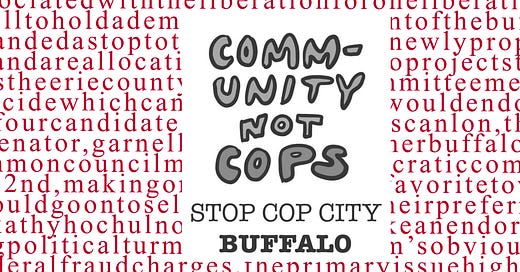Buffalo Residents Say ‘No to Cop City’
Community members protest Erie County Democratic Committee meeting opposing the $5 million police training facility proposal.
Activists associated with the Liberation for One Liberation For All (LOLA) organization braved the -1° wind chill to hold a demonstration in front of the Buffalo Convention Center on Tuesday February 18th. They demanded a stop to the funding of the newly proposed police training facility in Buffalo’s East Side and a reallocation of funding into projects to benefit the community. Inside the convention was the Erie County Democratic Committee meeting, which was the final mayoral convention to decide which candidate the party would endorse for this upcoming primary election in June. The four candidates are Christopher Scanlon, the current acting mayor, Sean Ryan, a New York State Senator, Garnell Whitfield, a former Buffalo Fire Commissioner and Rasheed Wyatt, a Buffalo Common Council member. The Democratic committee will announce its endorsement on February 22nd, making one candidate the favorite to win the primary.
The Erie County Democratic Party would go on to select experienced corporate politician Sean Ryan as their preferred nominee. Erie County native Governor Kathy Hochul notably did not make an endorsement for the race. The governor is currently facing political turmoil over Eric Adam’s obvious quid pro quo with Donald Trump to drop pending federal fraud charges.
The primary issue highlighted by the protest was the relatively large amount invested into the police department, namely the newly proposed training facilities estimated to cost a combined $4.89 million. In the neighboring town of Cheektowaga, a $2.1 million shooting range and police training center is being built which will be used by the BPD. Niagara County also invested $4.54 million in a 15,000-square-foot law enforcement academy on the NCCC campus, over two-thirds of the funding for which came from the federal American Rescue Plan intended for economic stimulus, not law enforcement. Earlier this month, the city’s finance committee approved a $2.42 million grant for new police vehicles and another $500,000 grant for improvements to the Paderewski Drive department.
A hot issue this election cycle will be the city’s ongoing debt problem. The city has a deficit in the tens of millions, deepened the city’s declining revenue from last year. A notable contributor is the fire and police departments struggling to fill vacancies, which has led to excess overtime pay. Cuts to the police department at this point seem unlikely as their funding increased by $14.9 million in 2024 over the previous year.
Speaking at the protest was another candidate running for the Democratic nomination, community activist Michael Gainer, who didn’t make the cut for the party endorsement. Gainer advocates for community-run policing to supplement the city police with a more compassionate and trustworthy protective force.
In his speech, Gainer highlighted the need to fix the city’s budget, saying, “The majority of our debt right now is because of overtime; a lot of that goes disproportionately to the police force. Ten people made over $100,000 last year in overtime alone. We should have a moratorium on overtime for all public service and divert that money into essential programs.”
In the bitter cold, clutching hand-warmers, protestors called for the end of ‘cop cities,’ demanding investment in housing-for-all, transportation, living wages, and rent caps. Part of their call underlined the fact that Buffalo is still one of the most segregated cities in the country and that homelessness is drastically increasing while the city prioritizes police funding first. Amplifying this is the lack of accountability for the city’s police, which one of the founding LOLA members made a point of saying, “Of the 934 allegations of misconduct by the Buffalo police reported since 1995, only 9% of those cops were ever disciplined, and guess who investigates them? They investigate [themselves].”
Exposing the contradiction of ever-increasing police spending alongside a decline in community spending is part of a nationwide trend originating with the abolition movement and Black Lives Matter. Since the summer of 2020, when police reform seemed to drive politics at the time, police budgets have only increased and become more militarized. In Atlanta, an urban warfare training campus was established, colloquially named ‘Cop City,’ which caused other cities like Buffalo to make similar large investments. Protests such as these will only grow in size and frequency as the city ignores the demand to reform policing and invest in our declining Buffalo community.





